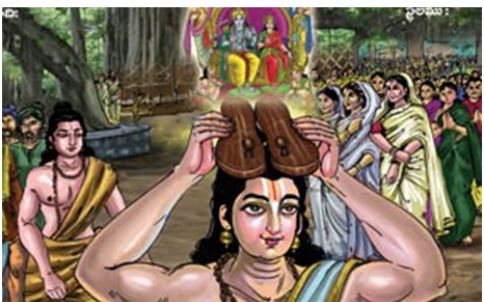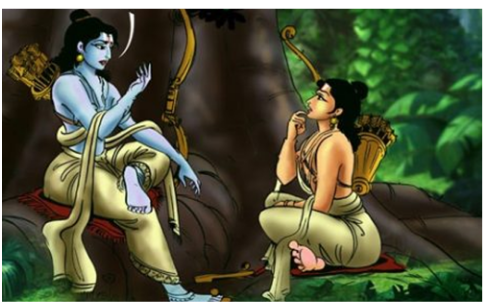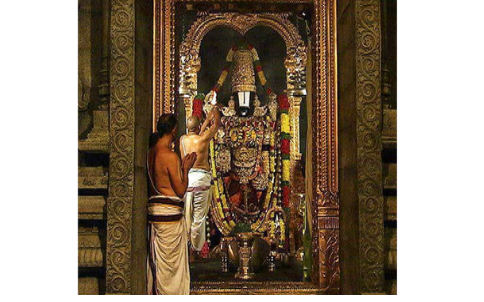Tiruppavai Stories
KeechuKeechuEndruEngumAanaichathanKalandhu
PesinaPecharavamKettilaiyo? Peypennnay!
KasumPirappumKalakalappa-k-kai Perthu
VaasanarumKuzhalAaychiyarMatthinal
OsaipadutthaThthayir-aravamKettilaiyo?
NayagaPpennppillaiy! Naaraayanan Moorthy
KesavanaiPpadavvum Nee Kettekidatthiyo
ThesamudaiyaiThirav-el or Empaavaai.
English poem
As dozens of birds chirp together at dawn
O, crazy, listen to morning dialogues of Bharadwaja birds.
Hear the music of golden necklaces & bangles.
Of lovely hands; feel the fragrance of flowers of their hair
Churning curds by staffs, can’t you hear?
O, the lady of Naaraayana, get up, to lead us.
To Keshava and to sing with us, His praise.
Awaken, open the doors & let us go, my girl.

The threshold in front of Lord Venkateshwara in Sanctum Sanctorum is worshipped as Kulasekhara. In this Paashuram, Goda is waking up Kulasekhara Alwaar. He is a shining jewel among the 10 Aalwaars. He is a Kshatriya, of the ruling class, He is a guru of gurus, i.e. Parama Acharya. Thus, the acharya mantra is ‘AsmatParamaGurubhyonnamah”. When God appears and offers a boon to Kulasekhara, he seeks to be a threshold at the sanctum sanctorum of Tirumala Temple so that he would be looking at the God always and enjoy touch of foot (padasparsha) of devotees. The threshold before Lord Venkateshwara is thus called KulasekharaPadi, none except the ardent archakascan cross it.
Also read: The stories of Tiruppavai: Krishna’s boon to Poothana who gave poisonous milk
Goda in this 7th song is waking up KulasekharaAlwaar. She sang morning song for Periyaalwaar, her father in her 6thPaashuram, which embodied the Acharya Vandana “Asmat GuruBhyonnama” (Namaskarm to my Gurus). In this song, Goda is saying “AsmatPaRaamaGurubhyonnamah”. (Salutations to Guru of Gurus, ex:Kulasekhara)
Gopikaat the doorstep indicate three points to convince the Gopika inside about the passage of night and beginning of dawn. In 6thPaashuram chirping of birds, Conch sound, chanting of Hari Hari by Yogis and Munis are the three sounds of the morning to be noticed. Birds render great service to the mankind by waking them up at right time with their sounds unknowingly. Sankha Naadam (sound of the Conch) tells us that it is time to pray to God. It is Omkaram, which links us to God, whereas the third sound is the chanting of Munis and Yogis which is the result of human effort.
What is the meaning of chirping sounds of birds? Goda says, they are planning to fetch food together for their children. They can fly with two wings- Knowledge and Practice. Rishis meditate for some time, then come out to discuss with other Rishis, and they go back to penance. The chirping is nothing but such conversation, Goda says.
Also read: Tiruppavai-5: Krishna’s divine name: a spark of fire that burns piles of sins

Bharatha, great brother of Rama
This Song mentions about Bharadwaja Muni. Bharadwaja birds which are found in Kerala-Tamil Nadu coastal region make sounds like Parrots. Prince Raama during his exile, stays for a night at Bharadwaja’s Ashram (residence). Thereafter, Bharatha, with his family, Gurus, royal staff and army arrives at the forest in search of Raama, and pays respects to Bharadwaja in his Ashram. Bharadwaj asksBharatha, “What else do you want to do to Raama, who is innocent and harmless: Why are you searching for him?”.
Also read: Tiruppavai-4
He said: “in all these years you have learnt three fistfuls from the three Hills of Vedic knowledge. Now you can stop learning and start the practice of what you gained”. To reach God, one must serve His devotee. This is a quote from Bharadwaja Samhita. Bharadwaja was trying and testing who would be such a divine devotee whom he can cultivate as a contemporary colleague, and he found Bharatha after spending all his Taposhakti&knowledge attained in 900 years. Goda says it is not enough to meditate on God, one should frequently meet the devotee.
Bharadwaja spent all Taposakthi to build this palace just to test the devotion of Bharata. But he was happy to discover a great Bhagavatottama in him. Bharadwaja uses all his PurushAyush (300 years of life of pious man) to learn a small part of Veda Adhyana. He invokes from God another PurushAyush to study Vedas further. He could not complete and asks for another 300 years from Prajapathi. Three terms Ayush of 300 years each was not enough for him to learn even a little portion of Vedas. When Bharadwaj did Tapas again, Prajapati appeared and showed there three big hills of Vedas and a fistful of earth on each Hill.

The question is quite derogatory and suggestive of suspicion. Pained, Bharathafalls on his feet and cries: “Muni, you know past, present and future, don’t you know my role andcan’t you read my mind?”. Bharadwaja wants to test him further. He creates a spacious Royal palace for all who came with Bharata and asks him to take the King’s seat. Bharatha leaves it and goes to a nearby seat meant for the Minister and operates the hand-fan towards the Simhasana as if Raama is sitting there. This proves that he was not fond of occupying the king’s seat.
Keshava kills Keshi
Krishna became Keshava when he killed a demon-horse in a very unusual manner. It was the demon Keshi, in horse form that attacked Krishna with open mouth. Little Krishnapushed his hand into his mouth.Keshi was happy that he could eat the tender hand away. But that was a play (a leela) for little Krishna, who increased the size of his hand making Keshibreathless. Keshi died as the enlarged hand spread to the entire body.
Also read: Tiruppavai-3: Narayana: divine name, philosophy and source of bliss




